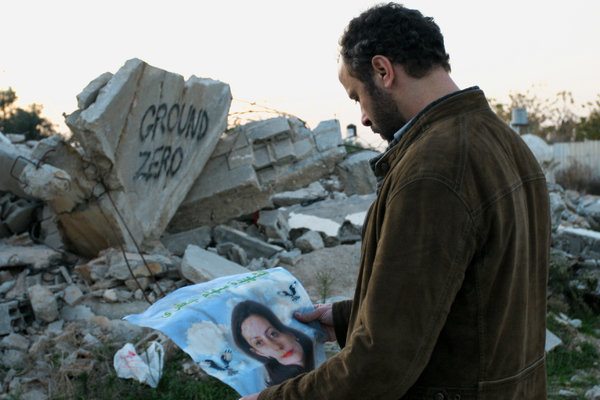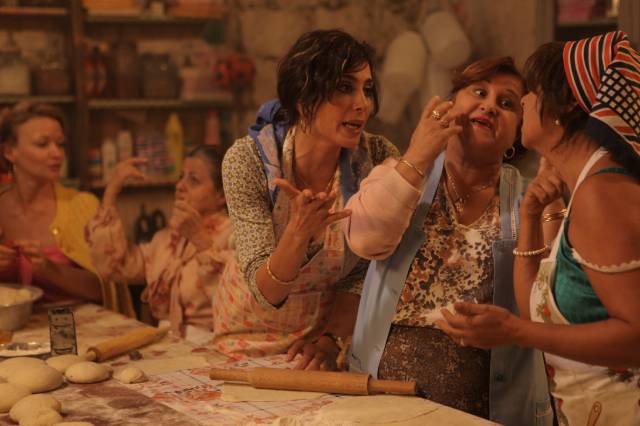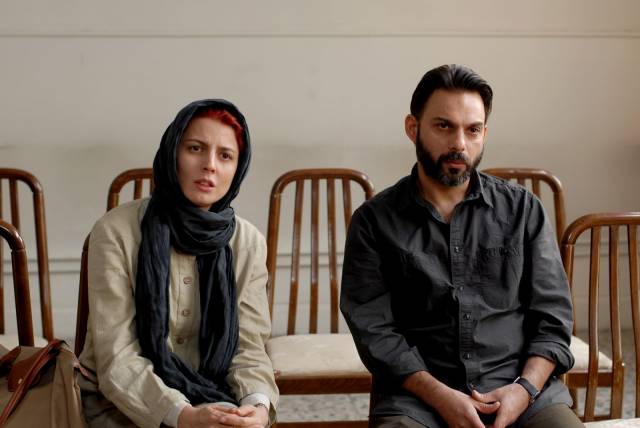
Films from the Middle East, at least the ones that make it all the way to North American audiences, have a stylistic flair and a certain unpredictable exoticism. These films gives glimpses into societies that are worlds away, countries that are mostly shut to the world by oppressive regimes, religion or war. While showing average people and their lives take on challenges, these are not action movies, but films about survival and love.
 Wajma or An Afghan Love Story (2013) - There are so few Afghan films that seeing one is rare and exciting. Directed by Barmak Akram, an Afghani now living in Paris, this film focuses on the particular microcosm of the lives of a handful of characters: Wadja (Wadja Bahar), her family, and her city of Kabul. Scenes showing aspects of daily life- the day’s first adhan, a traditional Afghan wedding, the morning walk to work through snow-covered streets, are what make this film so interesting— everyday life. It does not engage in world politics; however, when the eponymous love story of the film strikes, a very strict cultural and religious line is crossed, and the simple Wajma becomes a symbol for female subjugation, and for the rights of women everywhere.
Wajma or An Afghan Love Story (2013) - There are so few Afghan films that seeing one is rare and exciting. Directed by Barmak Akram, an Afghani now living in Paris, this film focuses on the particular microcosm of the lives of a handful of characters: Wadja (Wadja Bahar), her family, and her city of Kabul. Scenes showing aspects of daily life- the day’s first adhan, a traditional Afghan wedding, the morning walk to work through snow-covered streets, are what make this film so interesting— everyday life. It does not engage in world politics; however, when the eponymous love story of the film strikes, a very strict cultural and religious line is crossed, and the simple Wajma becomes a symbol for female subjugation, and for the rights of women everywhere.
 Omar (2013) - This is the second film of Palestinian/Israeli director Hany Abu-Assad’s to get nominated for an Academy Award. His first was the fiery Paradise Now (2005). Omar begins as a love story, and like Paradise Now, regional conflict ends up taking center stage, and inevitably life in the region interferes with love. Played by an acrobatic Adam Bakri, Omar frequently crosses the wall between Israel and the West Bank to visit his girlfriend Nadia (Leem Lubani), but this love is tested when Omar ends up prison for crimes he denies committing. Through a myriad of collusion by the secret police, Omar is forced to choose between two different sets of betrayal. The ending is a real shocker.
Omar (2013) - This is the second film of Palestinian/Israeli director Hany Abu-Assad’s to get nominated for an Academy Award. His first was the fiery Paradise Now (2005). Omar begins as a love story, and like Paradise Now, regional conflict ends up taking center stage, and inevitably life in the region interferes with love. Played by an acrobatic Adam Bakri, Omar frequently crosses the wall between Israel and the West Bank to visit his girlfriend Nadia (Leem Lubani), but this love is tested when Omar ends up prison for crimes he denies committing. Through a myriad of collusion by the secret police, Omar is forced to choose between two different sets of betrayal. The ending is a real shocker.
 The Attack (2012) - This film by director Ziad Doueiri stars Ali Suliman of Paradise Now. Suliman plays Amin Jaafari, an ultra-successful Arab surgeon living in Tel Aviv. In a public speech, he drives to stress that Arabs and Jews can live together in peace, but then there is a suicide bombing and Jaafari’s wife disappears. She has forgotten her cell phone and all things lighting, photography and mood point to her being gone. Just like that Jaffari’s world has crumbled, and so he sets out to try to make things right, to come to terms with the tragedy. His fall from grace is a vivid representation that tragedy can strike at any time, to anyone, even those with the best of intentions. Jaffari is guilty of disregarding all the signs, seeing only what he wanted to see, guilty of being human.
The Attack (2012) - This film by director Ziad Doueiri stars Ali Suliman of Paradise Now. Suliman plays Amin Jaafari, an ultra-successful Arab surgeon living in Tel Aviv. In a public speech, he drives to stress that Arabs and Jews can live together in peace, but then there is a suicide bombing and Jaafari’s wife disappears. She has forgotten her cell phone and all things lighting, photography and mood point to her being gone. Just like that Jaffari’s world has crumbled, and so he sets out to try to make things right, to come to terms with the tragedy. His fall from grace is a vivid representation that tragedy can strike at any time, to anyone, even those with the best of intentions. Jaffari is guilty of disregarding all the signs, seeing only what he wanted to see, guilty of being human.
 Where Do We Go Now? (2011) - It might sound impossible: taking a religious conflict between Christians and Muslims in the Middle East and making something playful and fun? Especially in today’s mega-serious religious climate, but this is exactly what the triumphant and brilliant Nadine Labaki has done in her film, Where Do We Go Now? Labaki, who also stars in the film as Amale, plays up the notion that women are of superior intellect, hinting that the Middle East would probably be at peace if it were up to the women. Everyday squabbles in the a small Lebanese village almost always lead to serious sectarian violence, but it is the women that, through a series of comic forays, always manage to avert the tensions. The comedy lies in how all the while the women make the men look like fools, but only to the audience. The women in the film still know their unfortunate, lower rung on the ladder, but are smart enough to exploit it.
Where Do We Go Now? (2011) - It might sound impossible: taking a religious conflict between Christians and Muslims in the Middle East and making something playful and fun? Especially in today’s mega-serious religious climate, but this is exactly what the triumphant and brilliant Nadine Labaki has done in her film, Where Do We Go Now? Labaki, who also stars in the film as Amale, plays up the notion that women are of superior intellect, hinting that the Middle East would probably be at peace if it were up to the women. Everyday squabbles in the a small Lebanese village almost always lead to serious sectarian violence, but it is the women that, through a series of comic forays, always manage to avert the tensions. The comedy lies in how all the while the women make the men look like fools, but only to the audience. The women in the film still know their unfortunate, lower rung on the ladder, but are smart enough to exploit it.
 A Separation (2011) - Winner of the 2011 Academy Award for Best Foreign Language Film. In modern day Tehran, Iranian writer/director Asghar Farhadi tells the story of a regular family, but while the story is simple, the overtones are complex. Parents Nader and Simin (Peyman Moaadi & Leila Hatami) are torn between going abroad, and staying in Iran to care for a sick, elderly parent. While not an overtly politically charged film, the family still brushes up against social and religious conventions, the reasons for their major obstacles. They file for divorce, but in Iran, and in Islam, divorce is not a simple affair, and so the application is denied. While tensions run high, unfortunate circumstances cause Nader to have to dismiss his housekeeper, Razieh (Sareh Bayat), and a series of unfortunate events follow that keep the audience totally invested in the film. Farhadi expertly shows the audiences glimpses of the truth, while hiding it from the characters. We see the tragedies unfolding knowing they could have been avoided. In this way, the film depicts quite ordinary people being torn apart as we watch.
A Separation (2011) - Winner of the 2011 Academy Award for Best Foreign Language Film. In modern day Tehran, Iranian writer/director Asghar Farhadi tells the story of a regular family, but while the story is simple, the overtones are complex. Parents Nader and Simin (Peyman Moaadi & Leila Hatami) are torn between going abroad, and staying in Iran to care for a sick, elderly parent. While not an overtly politically charged film, the family still brushes up against social and religious conventions, the reasons for their major obstacles. They file for divorce, but in Iran, and in Islam, divorce is not a simple affair, and so the application is denied. While tensions run high, unfortunate circumstances cause Nader to have to dismiss his housekeeper, Razieh (Sareh Bayat), and a series of unfortunate events follow that keep the audience totally invested in the film. Farhadi expertly shows the audiences glimpses of the truth, while hiding it from the characters. We see the tragedies unfolding knowing they could have been avoided. In this way, the film depicts quite ordinary people being torn apart as we watch.